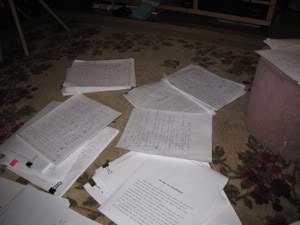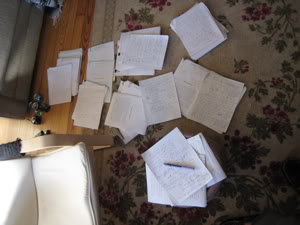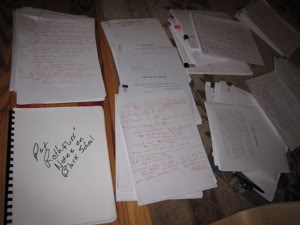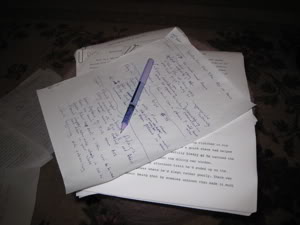I’m not at all convinced of the value of self promotion, but I’ve got a book coming out in just a hair over two weeks and I end up going back and forth on the subject. It goes a little like this:
MythOS comes out in 2 weeks!
That means that you’re at the point in the launch cycle where you should be frantically trying to do ninety and nine kind of promotion, right?
*cricket noises*
Right?
No…Maybe…I really don’t know…but probably, no.
Wait, isn’t that heresy. I mean, your publisher isn’t going to do a whole lot since you’re midlister and this a late book in the series. If you don’t do it, no one will, shouldn’t you be panicking?
There’s something to that. My promo budget is almost certainly minimal by publisher standards. At the same time, I’m not going to spend my way to a successful book launch. Not without a lot more money than I’d ever earn back, thus negating the point of the whole exercise. Even that assumes facts not evidence, i.e. that anyone knows how to apply money to the problem of book promotion in such a way as to generate significant sales for midlist books. If it could be reliably done, the publishers ,who have a lot more experience at the whole thing and a lot more books to sell, and hence greater incentive, would already be doing it.
But what about things that don’t cost much money? Shouldn’t you be frantically running around trying to drum up free publicity?
To an extent, sure. I’ll do any interviews that anyone wants to offer me. But checking in with my radio and print and bookstore contacts takes about an hour. What next? I could spend a ton of time to generate more effect, but I’ve got the same problem there that I have with money. Time is more expensive than money since there’s no way to get it back and there’s a diminishing returns effect that kicks in very quickly. In general, I think most self-promotion is a bad use of a writer’s time
Really? Why is that?
Anyone who is good enough writer to get something published, is almost certainly a damn good writer. This is for the simple reasons that the odds of success are lousy. I’ve got a highly specialized skill set for writing and none of the specialized skill set involved in promotion. That being the case I’m almost certainly better off investing the time and effort I’d spend on promotion in making my next book irresistible. I’ll have more fun that way and I’m more likely to be successful.
Okay I can see that, but I still think you should be out stumping for your book. Got anything else?
How about the numbers argument? Lets say that by doing a ton of promotion I can move a few hundred copies of my book that wouldn’t have sold otherwise. 20 at this signing over here. 50 by appearing on local radio. 50 by going to a con that I wouldn’t otherwise have gone to, and so on.
That’s great!
No, it’s not. A few hundred copies doesn’t really matter that much when a moderate print run is 10,000-20,000 books. Take my first book, WebMage. In the first six months I sold an average of 75 copies (mmpb) a day, every day. That earned out my advance plus ten percent. That was fabulous and I was delighted. But I need to double it.
Double it?
In order to make a marginal living I need to sell at least 150 mass market paperbacks a day every day for the rest of my life +inflation. Ooh, better double it again. To make a decent living I’d need to bump that up to something more like 300 a day. To crack six figures it’d have to be ~800 a day. Now do you see why I’m not that excited about spending many hours to sell a few hundred extra books?
I guess so. But you make it sound like there’s no way to win at this game.
I don’t think there is, not through self-promotion. I would love to believe that I could come up with a self-promotional effort that would have an ongoing several hundred books per day kind of impact on my sales and that wouldn’t eat up so much time it would be counterproductive in terms of writing the next book (or preferably the next several books). I’d also love to believe that my cats will support me in my old age….
That’s depressing. All right, Mr. Pessimist, so what do you suggest a writer does about it?
Write.
What?
It’s very simple. Write. If I take the same energy it would take to do a ton of self promotion and I focus it on what I’m good at–writing books—I can produce a complete extra book (or maybe even two) a year. Given that the best promotion that I know of is to have another book come out, one that’s as good or better than the last one, that seems like a simple bet. Especially when I consider that in addition to a new book’s impact on backlist, a new book generates its own sales to add to that books sold per day number. Not only will it promote my books in the best way possible, but it brings in new revenue and it’s a ton of fun. I love writing. That’s why I’m in this business.
Oh, I guess that makes sense. So, you’re not going to do any promotion?
I have a simple rule for promotion: It should involve no money, no time, and no effort.
That sounds like no promotion, all right.
Not quite. I’ll do a little. Here and there. Take this blog post, for example. I’m willing to bend my rules a little for pure promotion’s sake, but not much. I’ll spend some time, a little effort, a couple of bucks. I will also bend them for things that I enjoy doing, like cons, readings, and interviews. I’m a social person and an escapee from the theater asylum. I like meeting new people and being out on stage. I would do these things even if I wasn’t writing, though the book sure helps get interviews. I’m just not going to get wound up about the whole thing.
Any last thoughts for the folks who’ve made it all the way to the bottom of this post?
Yep. If you’re a writer who doesn’t like doing promotional things, or if you’re not good at them, don’t feel guilty about keeping your self-promotion to a minimum. Even if you do enjoy promoting yourself, realize that it’s a trade off. Time spent on promotion is time spent not writing, and writing is the point of the whole thing. Isn’t it?
(Originally published on the SFNovelists blog May 11 2009, and original comments may be found there. Reposted and reedited as part of the reblogging project)




